City Affordable Housing Policy Criticized at Industry Apartment Summit
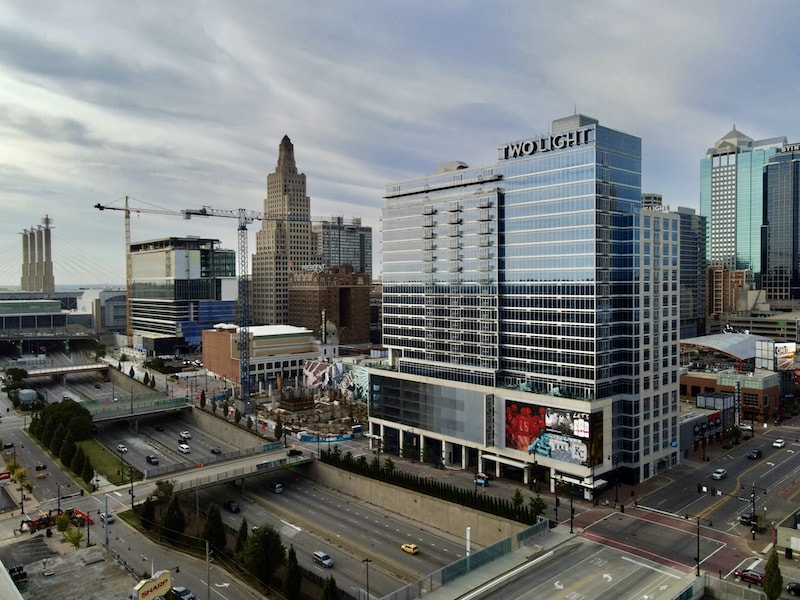
Published October 22nd, 2021 at 11:30 AM
By Kevin Collison
The affordable housing mandate approved by the City Council earlier this year has slowed project applications to a trickle despite robust growth in the overall metropolitan apartment industry, real estate professionals said Thursday.
“In Kansas City, there are headwinds,” Jeff Stingley of CBRE told the audience attending the 2021 Kansas City Apartment Summit sponsored by Midwest REnews at Westport Plexpod.
“It’s hard to find sites, construction costs in infill sites make it harder to build and of course, the city with their affordability ordinance, its pulled back on (developer) plans at least for now.
“It looks like urban core is going to see a pretty low delivery over the next few years.”
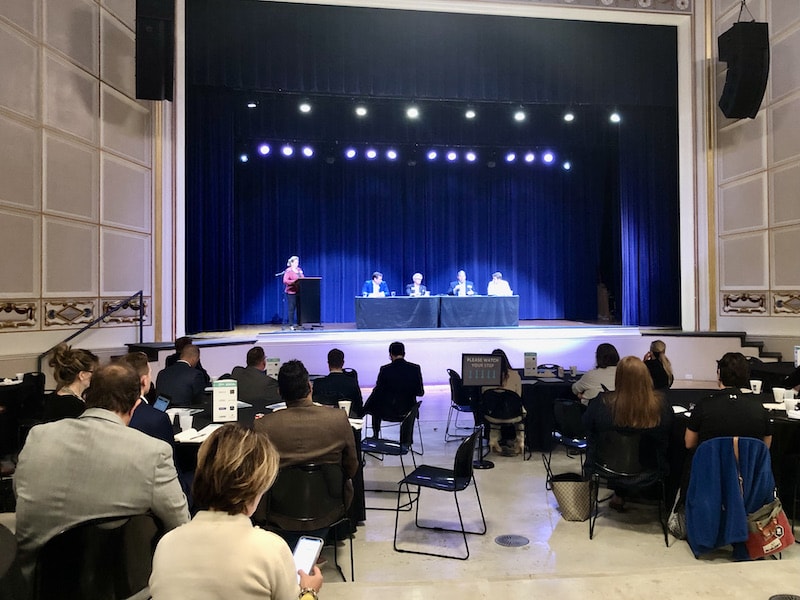
The 2021 Kansas City Apartment Summit was held at the Westport Plexpod.
Stingley said the metro as a whole is coming off a record year with 5,900 new apartments delivered in 2021 and another 3,100 already anticipated next year.
The panelists explained the Kansas City apartment market remains strong partly because of the tight supply of single-family starter homes.
“The outlet that is the single-family housing market, there isn’t any inventory there,” said Brandon Svec of CoStar. “Even renters who want want to buy are still locked into the renter world for probably another year.
“As long as we continue to see strong household formation and a single-family sector that’s extremely tight, it will support multi-family demand.”
But what share of that construction will occur in the city and downtown is uncertain because of the Council affordable housing ordinance that took effect in April, several panelists noted.
It requires any project receiving tax incentives to reserve 10 percent of its units as affordable and 10 percent as “extremely” affordable.
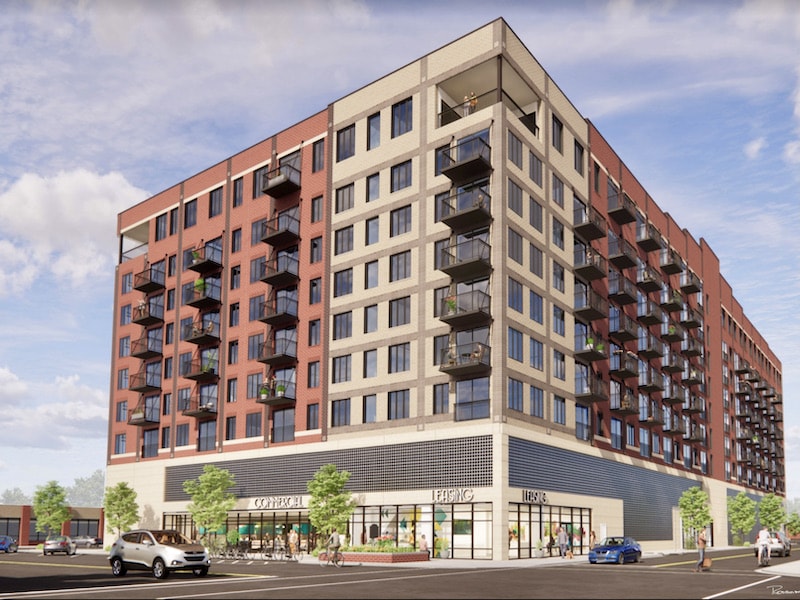
This 208-unit Oxbow apartment building is being built by Sunflower Development in the heart of North Kansas City (Rendering from Rosemann & Associates)
Affordable was defined as a household with an income at or below 70 percent of the Metro Kansas City median family income (MFI), according the the U.S. Housing and Urban Development Department. Extremely affordable was defined as 30 percent of MFI.
When the ordinance was debated, a development industry study estimated that maximum monthly rents developers could charge for an affordable apartment would be $853 for a studio, $990 for a one-bedroom and $1,091 for a two-bedroom.
To meet the extremely affordable standard, maximum monthly rents would be $252 for a studio, $302 for a one-bedroom and $317 for a two-bedroom.
Developer E.F. “Chip” Walsh of Mercier Street told the summit audience the new ordinance prompted a flood of applications before it took effect in April followed by sharp drop.
Walsh said from the beginning of December to April, there were 31 project apartment applications to the Kansas City Economic Development Corp. totaling 5,400 new or renovated units valued at $1.4 billion, a “huge spike.”
“The more troubling side is what’s happened since,” he said.
“From April through August, only four applications were received. As the city is looking at how to address affordability and the impact of the ordinance, you’ve seen that being dampening effect.”
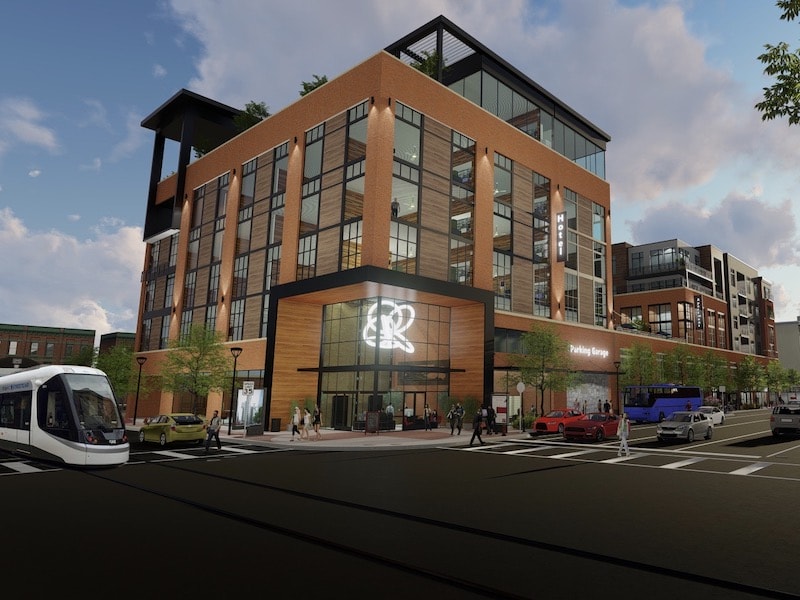
Rendering of mixed-use project proposed for Third and Grand by CBC Real Estate Group and EPC Real Estate Group (Image from the developer)
Svec called for the city officials to work cooperatively with developers to come up with policies to address the need for more affordable housing.
“Public private partnerships are what it’s going to take,” he said. “Market forces won’t solve this crisis. What’s actually is going to solve affordability is more supply.
“So lets not put onerous restrictions on development and let’s actually encourage development and subsidize development such that we can increase the overall supply of housing.”
Architect Scott Rosemann of Rosemann & Associates agreed the city’s affordable housing policy is not working.
His firm works in a dozen states and has found the greatest success providing affordable housing comes when its part of mixed-income projects. One of the best incentive tools is the 4 percent state and federal low-income housing tax credit program.
“We’ve seen a half-dozen projects utilize that tax credit and mix with Class A rents,” Rosemann said.
“We have a project now where 20 percent of the units are 80 percent AMI (area median income), 10 percent at 60 percent and the rest are market rate.
“I think those projects are a great solution to a lot of problems, but that doesn’t fit with the Kansas City ordinance. Getting the city to work with developers and designers to create that project is where we see the future going.”
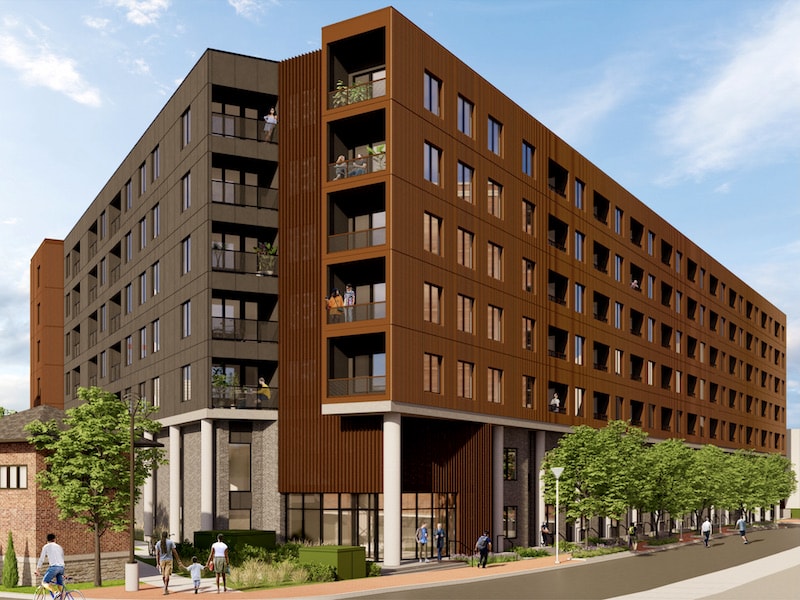
The 193-unit Tracks apartment project is expected to break ground in the Freight House District by the end of the year. (Rendering from Helix)
Walsh observed the issue of affordable housing is a complex public policy issue.
“Within affordability, there’s always this debate, do we have an affordability crisis or a wage crisis?” he asked.
“Where are incentive dollars being put first? it’s a fair question to ask where we want to target, but it seems to have moved from how do you expand the circle or table to how do you exclude other areas.
“I don’t think that’s helpful in the longterm and will have unintended consequences.”
Developer Caleb Buland of Exact Architects said he recently met with City Manager Brian Platt and city planners to discuss ways to reduce development costs.
“The fact that they’re asking, they’re open to it, that we’re not the only ones experiencing this means that we’re heading in a good direction,” Buland said.
Other challenges to apartment developers include sharply climbing costs for construction supplies and labor shortages.
“Pre-covid, we could predict 5-6 percent inflation per year and plan for that,” said Natalya Steinke of MW Builders “In the first six months of 2021 we’ve experienced 18 percent inflation.
“This unprecedented inflation has become a stumbling block for a lot of projects.”
As for downtown, Stingley of CBRE said the demand remains strong and additional apartment projects are needed.
“Downtown is always a supply issue, rather than an aversion to urban living issue,” he said.
“Anybody that goes down there on weekends and First Friday will attest its’s packed and fun and a place people want to be.”
Don’t miss any downtown news, sign up for our weekly CityScene KC email review here.


